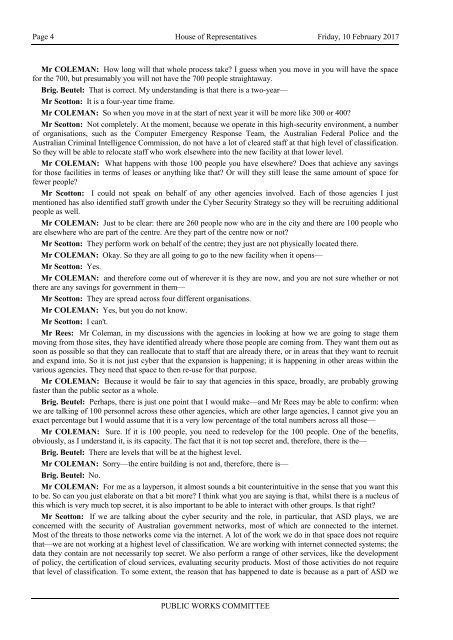Proof Committee Hansard
2lzgylL
2lzgylL
You also want an ePaper? Increase the reach of your titles
YUMPU automatically turns print PDFs into web optimized ePapers that Google loves.
Page 4 House of Representatives Friday, 10 February 2017<br />
Mr COLEMAN: How long will that whole process take? I guess when you move in you will have the space<br />
for the 700, but presumably you will not have the 700 people straightaway.<br />
Brig. Beutel: That is correct. My understanding is that there is a two-year—<br />
Mr Scotton: It is a four-year time frame.<br />
Mr COLEMAN: So when you move in at the start of next year it will be more like 300 or 400?<br />
Mr Scotton: Not completely. At the moment, because we operate in this high-security environment, a number<br />
of organisations, such as the Computer Emergency Response Team, the Australian Federal Police and the<br />
Australian Criminal Intelligence Commission, do not have a lot of cleared staff at that high level of classification.<br />
So they will be able to relocate staff who work elsewhere into the new facility at that lower level.<br />
Mr COLEMAN: What happens with those 100 people you have elsewhere? Does that achieve any savings<br />
for those facilities in terms of leases or anything like that? Or will they still lease the same amount of space for<br />
fewer people?<br />
Mr Scotton: I could not speak on behalf of any other agencies involved. Each of those agencies I just<br />
mentioned has also identified staff growth under the Cyber Security Strategy so they will be recruiting additional<br />
people as well.<br />
Mr COLEMAN: Just to be clear: there are 260 people now who are in the city and there are 100 people who<br />
are elsewhere who are part of the centre. Are they part of the centre now or not?<br />
Mr Scotton: They perform work on behalf of the centre; they just are not physically located there.<br />
Mr COLEMAN: Okay. So they are all going to go to the new facility when it opens—<br />
Mr Scotton: Yes.<br />
Mr COLEMAN: and therefore come out of wherever it is they are now, and you are not sure whether or not<br />
there are any savings for government in them—<br />
Mr Scotton: They are spread across four different organisations.<br />
Mr COLEMAN: Yes, but you do not know.<br />
Mr Scotton: I can't.<br />
Mr Rees: Mr Coleman, in my discussions with the agencies in looking at how we are going to stage them<br />
moving from those sites, they have identified already where those people are coming from. They want them out as<br />
soon as possible so that they can reallocate that to staff that are already there, or in areas that they want to recruit<br />
and expand into. So it is not just cyber that the expansion is happening; it is happening in other areas within the<br />
various agencies. They need that space to then re-use for that purpose.<br />
Mr COLEMAN: Because it would be fair to say that agencies in this space, broadly, are probably growing<br />
faster than the public sector as a whole.<br />
Brig. Beutel: Perhaps, there is just one point that I would make—and Mr Rees may be able to confirm: when<br />
we are talking of 100 personnel across these other agencies, which are other large agencies, I cannot give you an<br />
exact percentage but I would assume that it is a very low percentage of the total numbers across all those—<br />
Mr COLEMAN: Sure. If it is 100 people, you need to redevelop for the 100 people. One of the benefits,<br />
obviously, as I understand it, is its capacity. The fact that it is not top secret and, therefore, there is the—<br />
Brig. Beutel: There are levels that will be at the highest level.<br />
Mr COLEMAN: Sorry—the entire building is not and, therefore, there is—<br />
Brig. Beutel: No.<br />
Mr COLEMAN: For me as a layperson, it almost sounds a bit counterintuitive in the sense that you want this<br />
to be. So can you just elaborate on that a bit more? I think what you are saying is that, whilst there is a nucleus of<br />
this which is very much top secret, it is also important to be able to interact with other groups. Is that right?<br />
Mr Scotton: If we are talking about the cyber security and the role, in particular, that ASD plays, we are<br />
concerned with the security of Australian government networks, most of which are connected to the internet.<br />
Most of the threats to those networks come via the internet. A lot of the work we do in that space does not require<br />
that—we are not working at a highest level of classification. We are working with internet connected systems; the<br />
data they contain are not necessarily top secret. We also perform a range of other services, like the development<br />
of policy, the certification of cloud services, evaluating security products. Most of those activities do not require<br />
that level of classification. To some extent, the reason that has happened to date is because as a part of ASD we<br />
PUBLIC WORKS COMMITTEE















